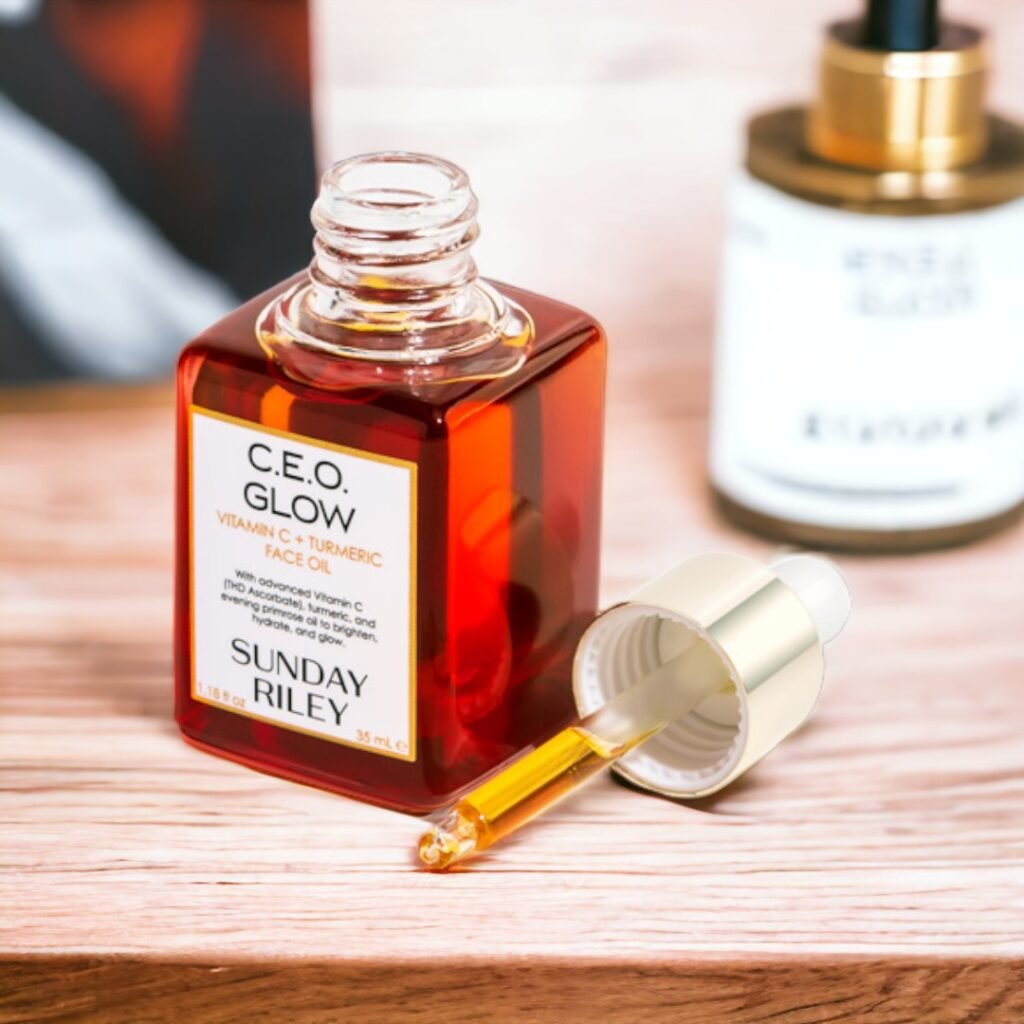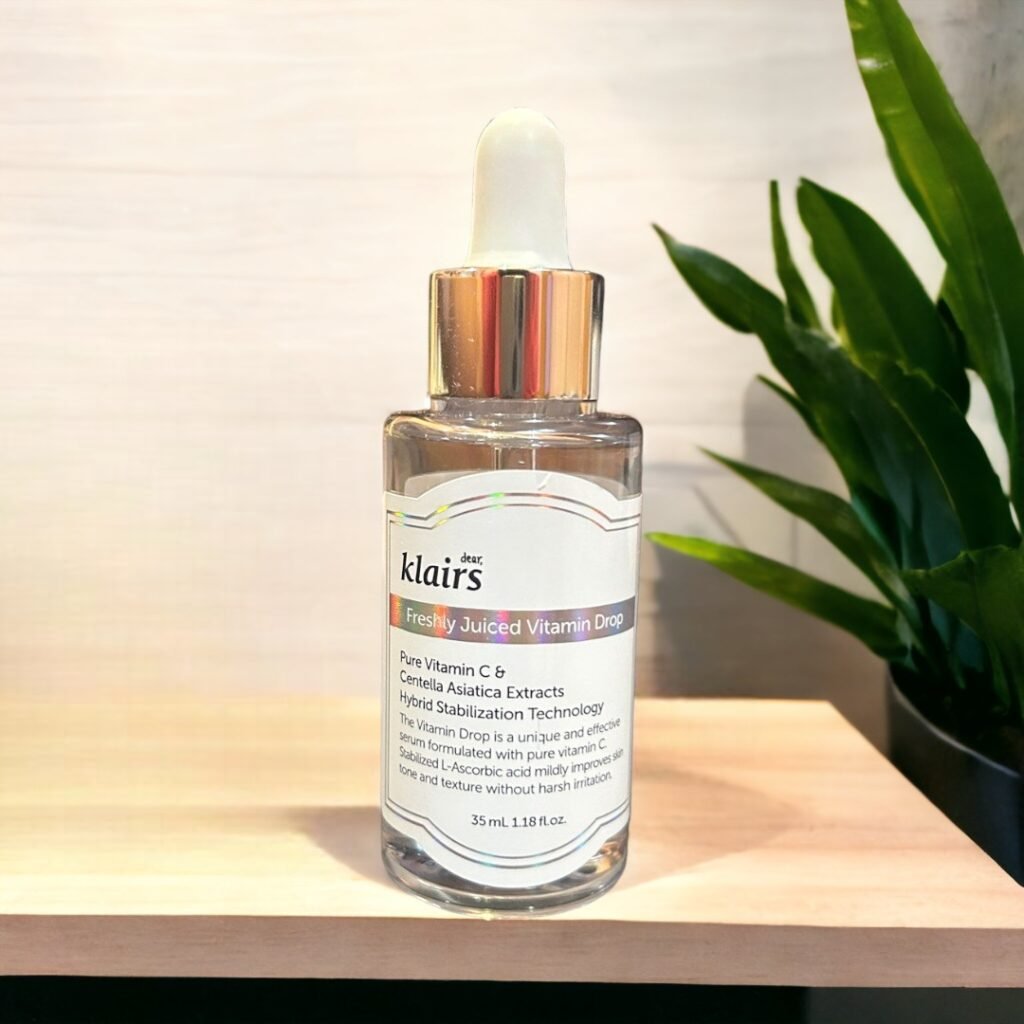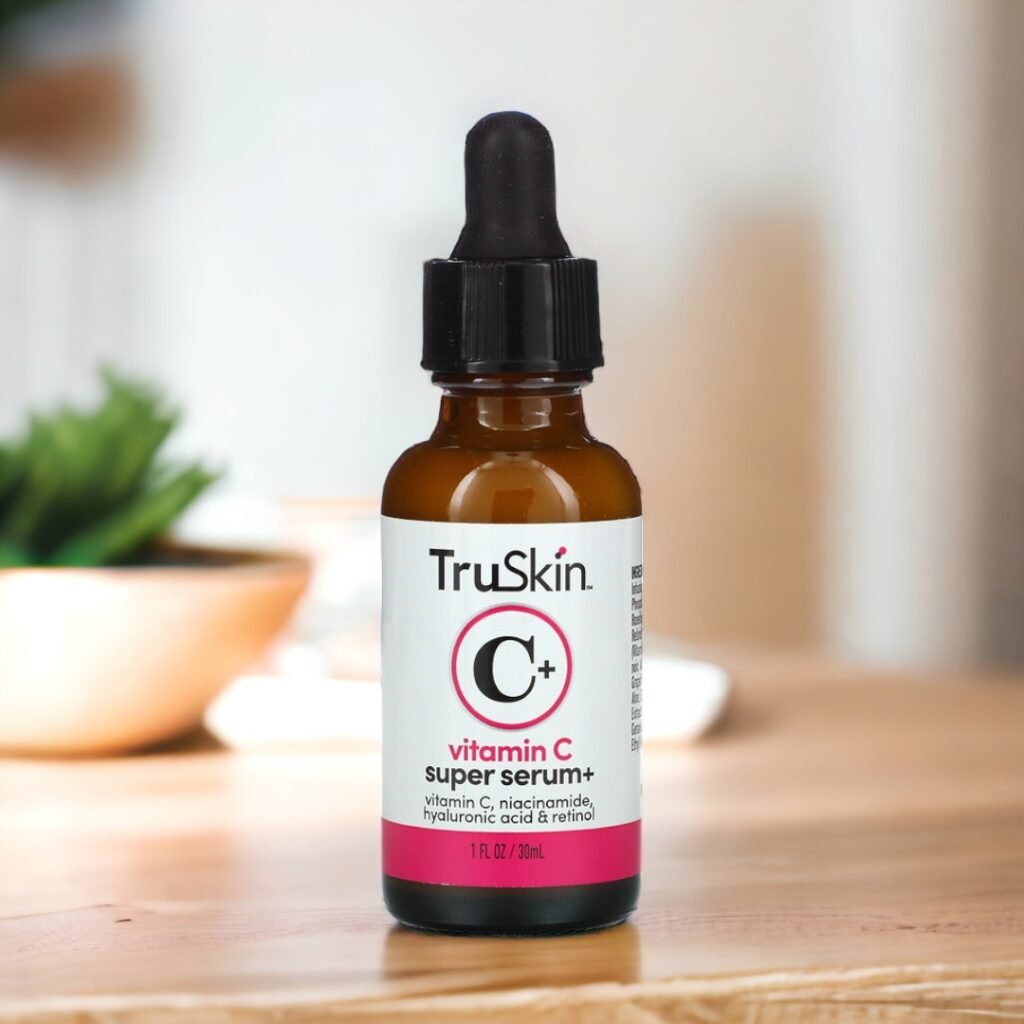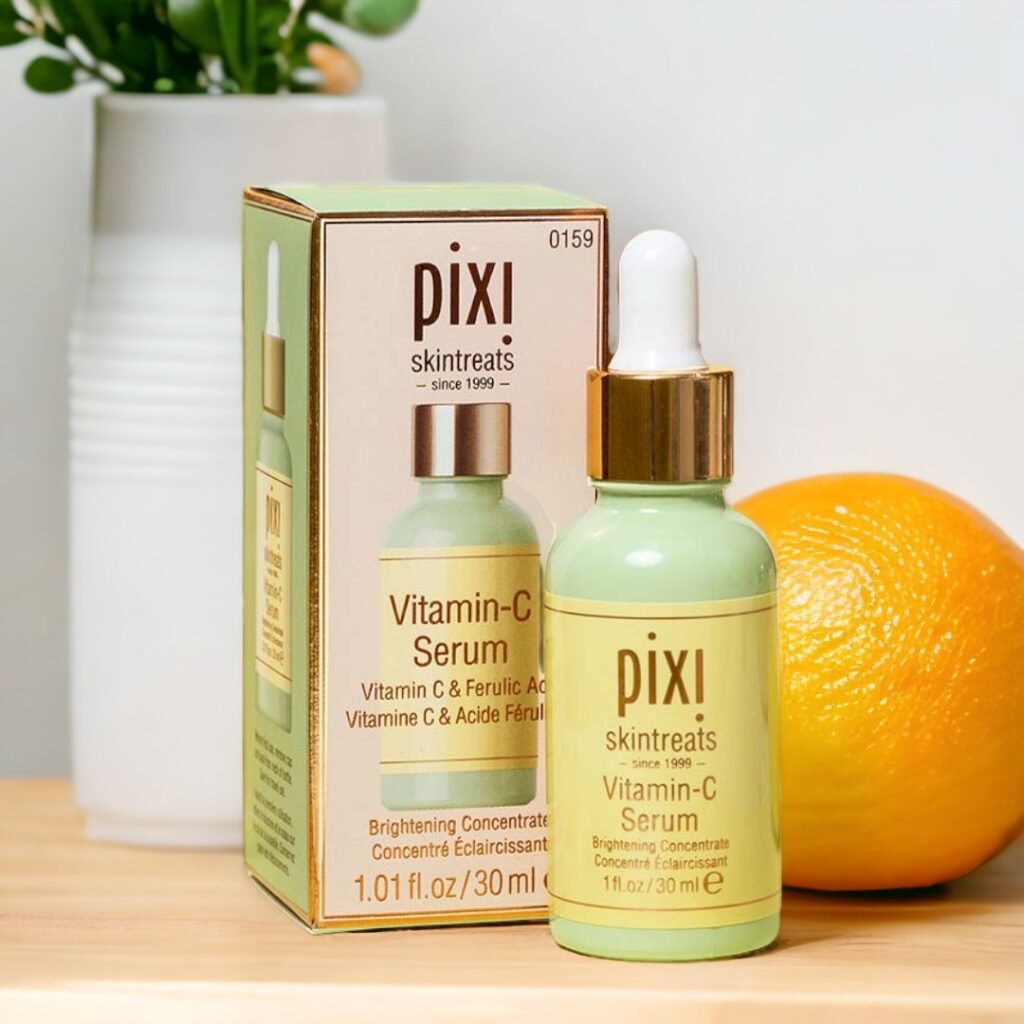We’re all familiar with the magic of Vitamin C, right?
It’s like a skincare superhero – it brightens, hydrates, calms redness, fights the signs of aging, and generally does wonders for your skin.
Sure, you can have your daily dose of Vitamin C from your diet, but if you want to give your skin a direct boost, serums and other topical products are where it’s at.
Now, you’ve probably heard a lot about Vitamin C serums, but there’s another little secret weapon for your skin: Vitamin C oil.
I know they’re less popular because they tend to be thicker in consistency, but they are like a nourishing treat for the top layers of your skin.
These oils give your skin a double dose of goodness – nutrition and hydration.
And if you have dry skin, they can even replace your moisturizer!
So, today, I’m here to spill the beans on everything you need to know about Vitamin C oil – the benefits, the best products out there, how to use them, and even a DIY method to whip up your very own Vitamin C oil with just two simple ingredients.
Let’s get that skin glowing!
Vitamin C Oil 101
So, what exactly is vitamin C oil?
Well, it’s essentially a blend of stabilized vitamin C, like ascorbic acid, mixed into a carrier oil or sometimes a combination of different oils.
These oils can’t dive too deep into your skin because they have a bit of a bigger molecular size, but they do a fantastic job of nourishing and hydrating the outer layers of your skin.
Now, here’s the exciting part – because of these unique qualities, a vitamin C oil for your face can replace your everyday moisturizer.
It’s like a two-in-one skincare superhero.
But hold on, there’s more to it! Let’s dig deeper into the fantastic perks of using vitamin C oil for your face.
What are the benefits of using Vitamin C oil?
Let’s address a common concern I’ve seen floating around the internet – the idea that using facial oils can be a recipe for acne, dryness, and clogged pores.
But here’s the thing: Not all face oils are created equal, and they don’t all serve the same purpose.
So, while I was digging into the benefits of Vitamin C oil, I stumbled upon something pretty surprising.
Vitamin C oil isn’t the villain here – it might be a hero for acne-prone skin.
You see, facial oils, like vitamin C-infused ones, actually work in harmony with your skin’s natural oils.
They help balance your complexion, lock in moisture, and slow down the skin’s sebum production rate – a game-changer for oily skin types.
But that’s not all.
Vitamin C oil for your face is packed with lipids, which are crucial for your skin.
They help rebuild your skin’s protective barrier, smooth your skin texture, and leave it feeling soft and plump.
Plus, the vitamin C there is like a spotlight, giving your skin a healthy glow.
Here’s the bonus: plant-based oils, like those with vitamin C, are usually loaded with antioxidants.
Antioxidants help reduce redness, and vitamin C also kicks your skin’s cell turnover into high gear, replacing damaged cells with fresh, healthy ones.
And guess what?
Collagen production – that secret to youthful skin – can’t happen without vitamin C.
So Vitamin C oil does come with a whole lot of perks.
Potential side effects of using Vitamin C oil
Vitamin C oil is quite the superstar in the skincare world, packing a bunch of benefits.
But, just like any other skincare product, it’s not without its quirks and potential side effects.
One of the most common things you might encounter when using Vitamin C oil is a bit of skin irritation.
Think redness, itching, or that fiery sensation.
This troublemaker often creeps in because Vitamin C oil packs a punch with its high concentration of, well, Vitamin C.
Sometimes, that potency can be too much for specific skin types.
On top of that, you might notice some dryness, flakiness, or even a bit of peeling, especially if the oil isn’t tailored to your skin’s unique needs.
So, it’s always a good idea to chat with a dermatologist.
They can help you know your skin type and whether that particular Vitamin C oil is a match made in heaven or if you should swipe left on it.
What’s the difference between Vitamin C and Vitamin C serum?
So, when it comes to Vitamin C, what’s the scoop on choosing between Vitamin C oil and Vitamin C serum? What sets them apart?
Here’s the deal: Vitamin C oils are a bit heavier in molecular weight, while Vitamin C serums are super lightweight.
Why does this matter?
Because it affects how deeply they can get into your skin.
Vitamin C serums are like precision instruments, designed to zoom through your skin layers and target specific concerns.
Think of it this way: Vitamin C serums are like giving your skin a special supplement.
Their lightweight texture allows them to deliver many beneficial ingredients directly where they’re needed most, whether it’s peptides, glycolic acid, or Vitamin C.
Now, here’s the twist:
Vitamin C serums might not be as moisturizing as Vitamin C oils. While they can dive deeper into your skin, there’s a slight risk of your skin losing some of its precious moisture.
But with Vitamin C oils, it’s like creating a cozy seal around your skin.
That means all the good stuff from your skincare routine stays right where it belongs – in the deeper layers of your skin.
Now that you know Vitamin C oil is essential for your skincare, especially for my friends with dry skin, you must wonder: What are some of the best Vitamin C oils?
7 Best Vitamin C Oil for Skin [Tried & Tested]
Oil-based vitamin C serums are like a magical blend of the goodness of vitamin C and hydrating oils.
They team up to give your skin a double dose of hydration and antioxidant protection.
But here’s the twist – not all Vitamin C oil products are a full-on oil fest.
Some might have a lower percentage of oil and more of that watery goodness.
Now, let’s dive into a lineup of some crowd-pleasing oil-based vitamin C serums that I’ve given a whirl:
Drunk Elephant C-Firma Day Serum

If you’re searching for an all-rounder Vitamin C oil, let me introduce you to the Drunk Elephant C-Firma Day Serum.
What sets this one apart is how it keeps Vitamin C fresh.
You see, Vitamin C is a bit sensitive and can spoil, especially when exposed to light.
But Drunk Elephant has a nifty trick up its sleeve – they keep the serum and a powdered form of Vitamin C separate, so you can mix them up when ready.
What’s even more reassuring is that doctors give it a thumbs up, with a couple of dermatologists giving it a shout-out.
This serum packs a punch with L-ascorbic acid, plus it’s got some pumpkin-ferment extract and pomegranate enzyme buddies that team up to tackle dead skin cells and give you a nice exfoliation.
Oh, and it’s also cruelty-free.
SkinCeuticals C E Ferulic

You know how sometimes the products everyone’s raving about fall short?
Well, SkinCeuticals Vitamin C serum isn’t one of those disappointments.
This serum has a featherlight, speedy-absorbing formula that won’t leave your skin sticky or dried out.
Is it a breeze to apply and seamlessly fit into your skincare routine and the results? Well, they’re impressive.
The superstar in this serum is L-ascorbic acid, making up a whopping 15 percent of the potion.
Even with such a hefty dose of pure Vitamin C, it stays stable and works magic by diving deep into your skin.
I gave it a whirl for six weeks, and let me tell you, my skin felt like silk.
It was softer, smoother, and supple.
Now, sure, it’s not exactly easy on the wallet, but here’s my take:
I’d rather invest around $200 in a Vitamin C serum that will get the job done than toss my cash at many cheaper options that might not deliver the same results.
Quality over quantity, right?
Sunday Riley C.E.O. Glow Vitamin C + Turmeric Face Oil

Now, let’s discuss the Sunday Riley CEO Glow Vitamin C + Turmeric Face Oil.
It’s like a superhero serum, combining oil-based Vitamin C with the power of turmeric and other skin-loving ingredients.
This serum is lightweight, so it’s comfy on your skin and moisturizes things nicely.
However, I didn’t see any major changes in my skin tone after using it, like that dazzling brightening effect or extra radiance.
So, it’s not a “must-have” in my skincare lineup.
But hey, if you’re new to the world of Vitamin C or are searching for a product that gives you both a Vitamin C boost and some hydration, this could be your go-to.
Klairs Freshly Juiced Vitamin Drop

My fascination with Korean beauty recently led me to discover this little gem – Klairs Freshly Juiced Vitamin Drop.
It’s a hypoallergenic Vitamin C serum packing a 5% Vitamin C punch.
It’s on a mission to tackle those pesky dead skin cells, give your skin a radiant tone, and even help your pores look more behaved.
After I’d been using this serum for about three weeks, I couldn’t help but notice a delightful change.
My skin felt seriously hydrated, looked brighter, and had that lovely dewy glow.
The serum is like a quick-change artist – it sinks in fast and leaves your skin feeling soft and velvety.
The only thing I didn’t like was its glue-like smell (but it quickly went away and faded).
Biossance Squalane + Vitamin C Rose Firming Oil

If you’re looking for a Vitamin C oil that not only gives you the superhero benefits of Vitamin C but also shows your skin with hydration, give Biossance a try.
What’s cool about this formula is that it feels like your typical lightweight facial oil.
Some Vitamin C oils can have a bit of a gritty texture, but this one is all about that smooth, nourishing feel.
It’s like a double treat for your skin, offering fantastic antioxidant perks.
Now, I’ll be honest – it didn’t work any miracles in firming up the skin.
But if you’re searching for that radiant glow and smoother skin texture, I know this little beauty won’t disappoint you.
TruSkin Vitamin C Serum

If you’ve got sensitive skin, you struggle to find products that are kind to your skin but still get the job done.
Well, I gave TruSkin Vitamin C a whirl, and let me tell you, it’s the gentle superhero you’ve been searching for.
This serum had me feeling super comfy.
It did take a smidge longer, around 30 seconds, to dry compared to some other options, but once it did, it left my skin feeling moisturized and non-greasy.
And here’s the cherry on top: it didn’t mess with my pores.
Considering its effectiveness, non-irritating nature, and the fact that it’s suitable for all skin types without any harsh acids, I’m convinced it’s a good choice for sensitive skin.
Pixi Vitamin C Serum

Pixi’s Vitamin C Serum is about giving your skin that radiant glow and leveling up your complexion.
It has all the goodness that Vitamin C brings to the table, like its ability to stand guard against nasty radicals and pollution.
Here’s the scoop on the texture – it’s a light serum, although it does come with a tad bit of stickiness, which is pretty common with Vitamin C.
I didn’t mind it much because it’s not heavy on the skin, and that touch of stickiness disappears after about 2 minutes once it settles in.
However, I noticed no major changes after using it for two days.
One reason could be its orange fragrance – not everyone’s cup of tea.
Plus, it’s got quite a lineup of fruit extracts and essential oils, which might make it a bit too harsh for folks with sensitive skin.
So, it’s a bit of a mixed bag – not for everyone, but you can still give it a shot if you’re feeling adventurous.
How to use Vitamin C oil?
Wondering how to work your magic with Vitamin C oil?
It’s a common question because facial oils are relatively new players in the cosmetics game.
We all know the drill with cleansers, toners, and moisturizers, but what about oils? Let’s break it down.
Here’s your step-by-step guide:
#1. Cleanse Your Skin
First things first, give your face a good cleanse and tone.
Make sure you’re starting with a clean canvas by removing makeup.
This sets the stage for your products to dive deep into your skin and prevents any leftover makeup from causing mischief in your pores.
#2. Apply Moisturizer and Vitamin C Oil
First, apply your moisturizer to get that initial layer of hydration going.
Then, follow it up with your Vitamin C oil for an extra moisture boost.
You can also mix a few drops of oil with your moisturizer for a hydrating cocktail.
But here’s the deal: don’t ditch your moisturizer for the oil.
Your skin needs water and oil, and moisturizers deliver both like the complete package.
Conversely, oils are great at sealing in that moisture, but they can’t replace the full skincare lineup.
#3. Use the ‘Patting’ Technique
When applying the oil, don’t go overboard. A modest 4 to 5 drops should do the trick.
Try the gentle patting method instead of rubbing it in like you’re buffing a car.
Gently press and massage the oil onto your face and neck, using the entire surface of your hands.
#4. Follow Up with SPF
Always, always finish up with SPF.
Here’s a tip: be cautious when using facial oil with moisturizers that already have SPF.
Oils can dilute sunscreen, making it less effective.
If your moisturizer has SPF, consider applying a separate layer of sunscreen on top of your Vitamin C oil to ensure your skin is fully shielded from UV rays.
#5. Use It Morning and Night
Make Vitamin C oil a part of your morning and nighttime routine for the best results.
Remember to let your Vitamin C oil fully absorb into the skin before piling on other products or makeup.
If you rush it, you might end up with “pilling,” which means starting your routine again.
So there you have it, a foolproof guide to adding Vitamin C oil to your skincare routine.
But wait…what is the correct order of using Vitamin C oil?
When to apply Vitamin C oil?
Just like in the skincare world, the sequence of how you use your products can make a real difference.
When dealing with Vitamin C or any facial oil, here’s the scoop:
For your nightly routine, it should be the very last thing you apply, and for your daytime regimen, right before your SPF.
Now, the great debate – should you put on oil before or after moisturizer?
Well, the answer can depend on the specific products you’re using, but as a general rule of thumb, go for the oil after your creams and lotions.
Why, you ask?
Introducing oil into the mix creates a barrier on your skin.
That’s awesome for sealing in all the goodness from your moisturizers and serums, but it can make it tricky for other products to work.
They can’t entirely penetrate through the oil’s dense layer.
So, think of your Vitamin C oil as the grand finale in your skincare game.
How to make your own Vitamin C oil with just 2 ingredients?
I always get super pumped when it comes to DIY skincare.
There’s something special about whipping up your potions, especially when trying to dodge those pesky parabens and preservatives that some store-bought products sneak in.
But, let’s be honest: DIY is more for those “emergency” situations or when you’re in the mood for a bit of adventure.
After all, we’re not trying to outdo those skincare giants with their fancy tech and ingredients, right?
So, here’s the scoop on how you can craft your very own Vitamin C oil with just two ingredients:
- 1 orange peel
- 1/2 cup of virgin coconut oil
Method:
- Begin by giving that orange peel a good grating. There’s no need to go super fine, but let’s keep those flakes on the smaller side.
- Grab a pan and toss in the virgin coconut oil. Heat it over a medium flame. Once it’s warmed up a bit, toss in the orange zest and give it a good stir.
- As soon as it simmers, you’ll notice the oil taking on a lovely orange hue. At this point, turn off the heat.
- Now, strain the oil into an airtight bottle and pop it in a cool, dry spot.
Ta-da! You’ve just whipped up your very own batch of Vitamin C oil. Isn’t that amazing?
Wrapping Up
Vitamin C oils are like the guardians of the skin’s upper layers – they don’t dive too deep.
If you’re in the dry skin club or battling chilly, arid weather, this could be your secret weapon.
They hang out on the surface, creating a shield of protection while delivering a much-needed dose of hydration, nutrients, and all the Vitamin C goodness.
Always use your Vitamin C oil after moisturizer and before sunscreen. It’s a winning combo for optimal results.
But here’s the scoop: don’t go overboard with it.
Even though Vitamin C is a skincare superhero, it’s not without its kryptonite.
When you’re hunting for Vitamin C oil, consider your skin type and keep an eye on the concentration level.
You don’t want it too high, and you don’t want the consistency to be too thick; otherwise, it might not play nice with your skin.
So, that’s the lowdown on Vitamin C oil.
Now, I’m curious – what’s your go-to Vitamin C product? Tell me in the comment section.
FAQs
Is vitamin C oil better than serum?
Well, it’s not a one-size-fits-all answer.
Vitamin C serums have the superpower of deep absorption into the skin, while facial oils like Vitamin C oil mainly strengthen the skin’s outer layer.
So, they both bring their own unique benefits to the table. The choice ultimately comes down to what your skin loves most.
Does vitamin C oil give your skin a glow?
Absolutely! Vitamin C can work wonders to fade pigmentation and smoothen out your skin’s surface, banishing that dullness.
It’s like a secret weapon for that youthful, radiant glow.
Which vitamin C oil is best for your face?
Choosing the right Vitamin C oil depends on your skin type.
If you’re rocking normal or oily skin, go for L-ascorbic acid, the heavyweight champ of Vitamin C, like you’ll find in SkinCeuticals’ C E Ferulic.
But if your skin leans on the dry or sensitive side, opt for magnesium ascorbyl phosphate.
It’s a water-soluble form of Vitamin C, and it tends to be gentler on your skin.
